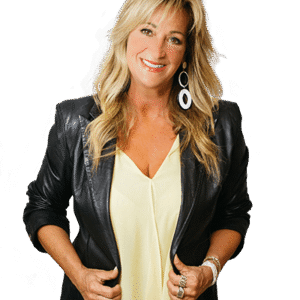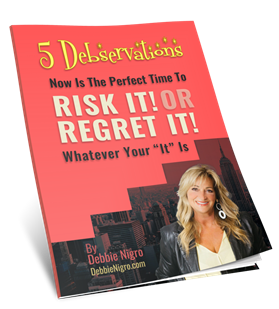
Wendy Chaite is a psychotherapist who brings a world of wisdom and compassion to the table. In honor of World Mental Health Day this month I felt it was a good time to talk about mental wellness and loss, and the importance of asking for help.

Wendy is not your everyday psychotherapist. She’s a former attorney, a career counselor for law students, and a national advocate for those living with chronic or terminal illnesses. Her work spans from helping the legal community manage stress and anxiety to guiding those dealing with grief and bereavement.

Did You Know That A Disproportionate Number of Lawyers and Law Students Suffer from Mental Illness?
Wendy said,
“Fortunately, there’s been a trend in the legal profession itself, recognizing the disproportionate number of lawyers and law students that suffer from mental illness, primarily depression, anxiety, and substance use disorder. And given the stress and the pressures of the field, that’s understandable and there’s also those that believe that also certain type personalities are attracted to the field. For example, people that are perfectionists or overachievers and that could also add to the stress of an individual experiences.”
“There’s are also the demands depending on the environment in which you work. If you work in a big law firm like I had, you have the expectations of very demanding hours where you’re working till 2 o’clock in the morning, your time is not your own. Also, just very often in different areas of law, there can be secondary trauma, let’s say you’re dealing with domestic violence clients, or other, you know, criminal related matters, that can be very traumatic, even for the attorney or the law student that’s experiencing that. “
“And there’s also quite a bit of competitiveness within, certainly during law school, I saw this as a big issue when I was working, I worked for a decade at a law school and the pressures of being able to compete. And very often, law students define themselves through external validation, whether that’s getting accepted onto law review or getting a big prestigious job.”

I asked Wendy the Big Question: *How Do You Know When You Need a Psychotherapist?
Her answer was simple but loud.
“I would say it’s when your private suffering impacts your life, whether it be at work or your personal life, and it’s interrupting your ability to function. And it does not have to be a severe dysfunction. It could even be a mild dysfunction, but where it interferes and you’re finding yourself suffering.”

Wendy also shared her journey through personal loss, particularly the tragic passing of her daughter, Melanie Rose at 26, who battled a rare lymphatic disease.
Wendy didn’t just face this tragedy—she transformed it into action by founding the Lymphatic Research Foundation which has had extraordinary worldwide impact. This is a testament to her resilience, and her choosing to lean into the difficult parts of life rather than shy away from them.
Many of us have a long tail of pain from those we’ve lost on this planet. Bereavement and grief are such heavy issues, and some people just can’t get past the pain.
Often a Psychotherapist like Wendy Can Help.
Wendy said,
“Well, I’ve been very successful working with my clients and not only just clients, but just people also that I meet in my day-to-day life that aren’t clients. I too am part of a bereavement group of other mothers that have lost their children. You had mentioned that I created the foundation because my daughter passed away. I created it during her lifetime, not after she passed so that hopefully she could benefit from the medical discoveries and millions of others as well.”
“it’s not uncommon for people to put their head in the sand, you know, because these are difficult things and you want to avoid it, you don’t want to deal with it. Instead, I recognized the importance of leaning into it, and not being afraid. And so, I educated myself on the death and dying process so that I could be of support to her. And I became a trained death and dying doula. I even took her to conferences and workshops on death and dying. And so, for a young woman facing mortality, we were able to journey through that in a very profound and beautiful way.”

I think Wendy’s message of embracing life’s challenges is powerful. Her personal experiences were profound.
Whether it’s the pressures of being a lawyer or law student or the struggles of grieving a lost loved one – it’s important to know it’s healthy to ask for help.
Wendy’s work is a beacon for anyone in need of support. She’s proof that even in the darkest of times, there’s always a way forward.
Hoping some of you will benefit from listening to this podcast of my live conversation with Psychotherapist Wendy Chaite on The Debbie Nigro Show. If you’d rather read than listen the transcript of the audio is below.
If you or someone you know could benefit from her expertise, please get in touch with her. Her website at WendyChaite.com
AUDIO TRANSCRIPT:
7
0:00:00
And now, back to the Debbie Nigro Show!
3
0:00:03
Hey, sometimes we all need somebody else to show us the way. That’s why I’m so glad I have this platform to showcase cool people who are smarter in areas that we aren’t and we need to ask for help. My goodness. Hey everybody, I’m Debbie Nigro.
1
0:00:28
This is my Wellness Wednesday show. Big on talking about mental health and taking the stigma off asking for help. And since tomorrow is World Mental Health Day, my timing is perfect to introduce you to my next guest. Wendy Chaite is a psychotherapist. She’s highly regarded.
1
0:01:08
She specializes in mental health and well-being psychotherapy for attorneys, law students, members of the judiciary. She’s a former attorney, federal judicial law clerk, law school mental health and wellness program administrator, law school career and professional development counselor, and adjunct law professor. She is uniquely qualified to serve everybody in the legal community, but she’s also a former national research and health care leader,
1
0:01:33
patient advocate and caregiver for 25 years, and she helps everybody individually and collectively navigate the challenges and opportunities presented to those living with chronic life-altering or terminal illness. And then she also helps people going through grief and bereavement. Loss is tough, right? And well, people who need to find a new sense of meaning in life. She’s got a lot going on. My question to her is going to be today,
1
0:02:04
when do you know you need a psychotherapist? Hey Wendy, welcome to the
2
0:02:08
show. Oh thank you so much Debbie, I really appreciate this opportunity to
1
0:02:13
speak with you. Oh you’re lovely and how do I know that Wendy? Because of your mother Myrna. This is how it all goes on my show Wendy. Myrna, your mother, is a doll. That’s number one. I love her, I admire her. I wanted her to come and be the guest on my show because I couldn’t believe her career. I was like, oh my God, you’ve got to be on the show. Your mother is Aunt Linda’s best buddy.
1
0:02:34
So I met her socially and we’ve been together and I love her. She didn’t want to have herself on my show. She said, no, no, no, you need to have my daughter. I was like, okay.
6
0:02:43
That’s so Myrna.
1
0:02:44
So Myrna, okay, tell me about your daughter, Myrna. So she tells me all about you and you are more than even she was able to explain. She was out of words for how fabulous you are, Wendy.
2
0:02:55
Thank you.
1
0:02:56
Yeah, I know you help a lot of people. And I know you’ve been on a whole bunch of national, state, and local task forces and all the committees dedicated to mental health and wellness in the legal profession. And I will get to your lymphatic research foundation as well, which I know you founded after you lost a daughter. And I’m so sorry about that loss because she was
1
0:03:15
diagnosed with a rare lymphatic disease and I know you’re a groundbreaker and that the world is thanking you for what you’ve done so all those things we’ll cover.
Answer the question first. World Mental Health Day tomorrow a billion people around the world have a mental health disorder. That’s a true number and earlier in the show I mentioned that one in two people is going to have a mental health disorder at some point in their life.
1
0:03:40
So, when does somebody know they need a psychotherapist?
2
0:03:44
I would say it’s when it impacts your life, whether it be at work or your personal life, and it’s interrupting your ability to function. And it does not have to be a severe dysfunction. It could even be a mild dysfunction, but where it interferes and you’re finding yourself suffering.
1
0:04:09
Yeah.
2
0:04:10
And that’s what I would say.
1
0:04:14
Can you tell me the difference and tell my audience the difference between a psychotherapist, a therapist, and a psychologist? Like what are the differentiators?
2
0:04:22
Actually I’m not the best person to do that. Okay, forget the question. I’m a mental health counselor. I could speak as to my training, but I would just say that, I mean, I know there’s different trainings for each and oftentimes different focus, like for example, a social worker will also often serve as a case worker or help individuals that are in hospitals, often serve as a caseworker or help individuals that are in hospitals upon discharge to get the resources that they need. That’s not my training. My training is focused on the mental health of individuals.
1
0:05:08
And so, sorry, somebody else would be better equipped to speak to that. Now, I want you, I want to just keep talking to you, Wendy. Wendy, so you had a big history in the law community and you must have recognized a need
2
0:05:24
there that I guess was loud in terms of mental health help. Absolutely, yes, absolutely and fortunately there’s been a trend in the legal profession profession itself is recognizing the disproportionate number of lawyers and law students that suffer from mental illness, primarily depression, anxiety, and substance use disorder. And given the stress and the pressures of the field, that’s understandable and there’s also those that believe that also certain type personalities are attracted to the field.
2
0:06:11
Let’s say for example people that are perfectionist or overachievers and that could also add to the stress of an individual experiences.
1
0:06:22
As you’re saying that and I think that because I loved entertainment law as one of my courses in Ithaca College and if I wasn’t doing this, I might have been an entertainment lawyer, but there was so much reading, so much information. I’m an information addict anyway and it was case after case and I thought, I’m thinking as you’re talking, just the sheer amount of reading and digesting and having to memorize all the legal jargon and cases is stress enough.
2
0:06:47
That’s got to be huge, right? Yes, that stress. There’s also, you know, the demands of depending on the environment in which you work. If you work in a big law firm like I had, you have the expectations of very demanding hours where you’re working till 2 o’clock in the morning, your time is not your own. Also, just very often in different areas of law, there can be secondary trauma, let’s say you’re dealing with domestic violence clients, or other, you know, criminal related matters, that can be very traumatic, even
2
0:07:26
for the attorney or the law student that’s experiencing that. And there’s also quite a bit of competitiveness within, certainly during law school, I saw this as a big issue when I was working, I worked for a decade at a law school and the pressures of being able to compete. And very often, law students in particular, they define themselves through external validation,
2
0:07:56
whether that’s getting accepted onto law review or getting a big prestigious job and one of the benefits of therapy is to help you identify what’s important to you, what are your values and how to align your life accordingly.
1
0:08:25
I mean, the only time you get that out of your mouth, you’re done. You need psychotherapy. Wendy. You know, on the bereavement side and the grief side, this is such a heavy issue for
1
0:08:42
people who can’t get past it, and we all have a long tail of pain from those we’ve lost on this planet. Some people just never get forward.
2
0:08:51
How often do you help people forward from that? Well, I’ve been very successful working with my clients and not only just clients, just people that I meet in my day-to-day life that aren’t clients. I too am part of a bereavement group of other mothers that have lost their children. You had mentioned that I created the foundation because my daughter passed away. Actually, I created it during her lifetime, not after she passed away, but in order to help advance science and medicine
2
0:09:26
so that hopefully she could benefit from the medical discoveries and millions of others as well.
1
0:09:34
Stop there for a second. Stop there because I know she was born with a rare lymphatic disease, is that where it started?
2
0:09:40
Yeah, she was born with a rare lymphatic disease and didn’t really appreciate the magnitude of it until maybe she was able, you know, she was in the school marching band, she was in theater, she was an A student, she had friends and went to parties. Unfortunately, during puberty, which oftentimes with medical conditions, the hormones can impact that, and that’s when things really started impacting her. She had to be home-schooled for a couple of years.
2
0:10:33
The teachers would come to her home because she was either spending months on end in the hospital or we were traveling across the country to participate in clinical trials to help find medicines that we could, I guess, in a way experimentally use with her.
1
0:10:52
Oh wow, this must have been very hard, but wow, I mean, this is a wow, and I’m so sorry you had this experience, and I’m sorry for your daughter, whose name was Melanie Rose, by the way. How old was she when she passed?
2
0:11:04
She was 26, and again, in part of the work that I do now is, you know, it’s not uncommon for people to put their head in the sand, you know, because these are difficult things and you want to avoid it, you don’t want to deal with it. I can’t even imagine. And I instead recognized the importance of leaning into it, and not being afraid. And so I educated myself on the death and dying process so that I could be of support to her. And I became a trained death and dying doula. I actually even took
2
0:11:50
her to conferences and workshops on death and dying. And so, you know, for a young woman mortality, we were able to journey through that in a very profound and beautiful way. Wow, that’s profound, as profound as I’ve ever heard, really.
1
0:12:10
I can’t even wrap my emotions around that. But what you’ve done and what her legacy will be, from what I understand, Wendy, is you were such a pioneer that you, and along with, I’m sorry I forgot the other gentleman’s name, started a whole pile of research and a path that now the world is grateful for regarding this disease.
2
0:12:35
Yeah, it’s really gratifying.
1
0:12:36
You personally, you personally changed the world.
2
0:12:39
Well, I would say if I may, the combination, and I’m a spiritual person I know it’s been a divine intervention that, you know, my daughter chose me to be her mother and I chose her to be my daughter. And oftentimes when people go through difficult and challenging and tragic situations, they can’t necessarily see the silver lining in that dark cloud. I’ve chosen to and I’ve, this whole journey and for her as well.
2
0:13:16
Amazing. I’ve really been one that it’s okay. It’s okay. You know, it’s really okay.
1
0:13:22
Well, you let a lot of, I’m sorry we’re out of time, but boy, have you been a wonderful guest, enlightening. Thank you. Obviously, if anybody could use a psychotherapist with the background you have, I imagine they could relate to, you can relate to many, many levels of people. Your website is wendyshade.com, is that correct?
5
0:13:41
Correct.
1
0:13:42
Okay, that’s C-H-A-I-T-E. I’ll put it up on social media, as I already have, and there’ll be the podcast after if anybody wants to share this with somebody else. And Wendy Chaite, thank you so much for your time. I wish you a blessed day. thank you so much for your time. I wish you a blessed day.
4
0:13:53
Thanks.
Transcribed with Cockatoo



